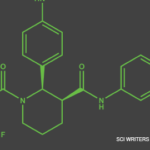Dr. Antiochos pointed out that patients treated with rituximab in the study were given this medication only as induction—a dose of 375 mg per meter squared of body surface area, given weekly for four weeks. No maintenance dosing was given at six months after induction, potentially increasing the risk of relapse. Also, the glucocorticoid taper was rapid, with tapering completed by week 21, faster than in current clinical practice. Finally, Dr. Antiochos explained that patients in the avacopan arm of the trial received some glucocorticoids. Thus, this study was not truly a glucocorticoid-free intervention.
Nevertheless, the findings of the ADVOCATE trial and the approval of avacopan by the U.S. Food & Drug Administration (FDA) are notable developments and warrant further exploration of the appropriate use of this medication in clinical practice.
The findings of the ADVOCATE trial & the approval of avacopan by the FDA are notable developments & warrant further exploration of the appropriate use of this medication in clinical practice.
Managing GCA
Next, Dr. Antiochos discussed mavrilimumab and GCA. Mavrilimumab is a human monoclonal antibody that inhibits the human granulocyte macrophage colony-stimulating factor receptor (GM-CSF), which promotes the differentiation, activation and survival of myeloid cells. Because upregulation of GM-CSF and its receptor have been found in temporal artery biopsies in patients with GCA, biologic plausibility exists for the use of mavrilimumab to treat GCA.3
In a phase 2, randomized, double-blind, placebo-controlled clinical trial on the efficacy and safety of mavrilimumab, patients with GCA, aged 50–85 and new or relapsing active disease were randomized to receive either mavrilimumab or placebo. Both groups received background treatment with a 26-week prednisone taper. The primary end point of this study was time to first disease flare as defined by erythrocyte sedimentation rate (ESR) levels of >30 mm/hr or C-reactive protein (CRP) levels of >1 mg/dL, along with clinical signs and symptoms of vasculitis activity or imaging evidence of vasculitis activity.
Results: Mavrilimumab proved superior to placebo for time to flare by week 26 and sustained remission in patients with GCA who were treated with a background, 26-week prednisone taper. The medication also appeared safe, with few reported adverse events overall. Dr. Antiochos noted that patients who experienced a disease flare with mavrilimumab demonstrated elevated acute phase reactants. This finding contrasts with what is seen in patients with GCA who are treated with tocilizumab, which suppresses inflammatory markers, such as CRP, making it challenging to use such markers to evaluate if a patient is experiencing disease relapse.


